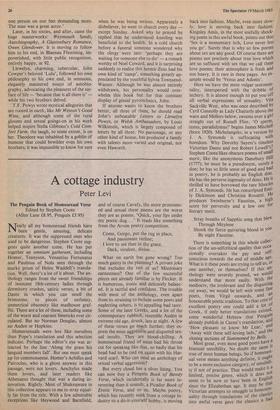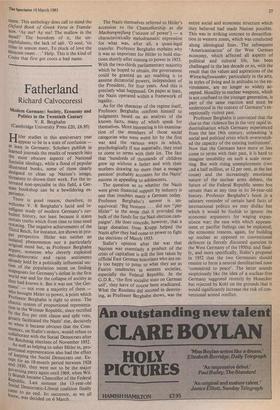A cottage industry
Peter Levi
The Penguin Book of Homosexual Verse Edited by Stephen Coote (Allen Lane £8.95, Penguin £3.95)
Nearly all my homosexual friends have been gentle, amusing, delicate creatures. It was the suppressed ones who used to be dangerous. Stephen Coote sug- gests quite another scene. He has put together an omnium gatherum, including Homer, Tennyson, Venantius Fortunatus and Paulinus of Nola seen through the murky prism of Helen Waddell's transla- tion. Well, there's a lot of it about. The an- thology ranges from the sweet friendships of innocent 18th-century ladies through dormitory crushes, satiric verses, a bit of Dante in which you can smell the brimstone, to pieces of unfunny, unmetrical obscenity like madhouse graf- fiti. There are a lot of these, including some of the worst and coarsest limericks ever cir- culated. But no Norman Douglas, almost no Auden or Hopkins.
Homersexuals were less like ourselves than Pope's translation and this selection indicate. Perhaps the editor's eye was at- tracted by the line 'Along the grass his languid members fall'. But one must speak up for commonsense. Homer's Achilles and Patroclus, who is a ghost anyway in this passage, were not lovers. Aeschylus made them lovers, and later readers like Athenaeus thought that was a daring in- novation. Rightly. Most of Shakespeare in this collection appears to me to stray equal- ly far from the title. With a few admirable exceptions like Heywood and Barnfield, and of course Cavafy, the more pronounc- ed and sexual these poems are the worse they are as poems. 'Quick, your lips under my poetic dug...' It reads like something from the Arvon poetry competition.
Come, Gorgo, put the rug in place, And passionate recline; I love to see thee in thy grace, Dark, virulent, divine...
What on earth has gone wrong? Too much gaiety in the planning? A private joke that excludes the rest of us? Missionary earnestness? One of the few successful pieces not already familiar is by Flecker. It is humorous, ironic and delicately balanc- ed. It is tactful and confident. The trouble with most of the anthology, even apart from its straining to include some poets and neglecting others, is its appalling bad taste. Some of the later Greeks, and a lot of the contemporary rubbish, resemble Auden in extreme old age, drunk, late at night. A few of these verses go much further; they ex- press the most aggressive and disgusted sex- ual insults. They are blood-chilling. A homosexual friend of mine had his throat cut for speaking like that, so badly that his head had to be tied on again with his Har- vard scarf. Who can need an anthology of sexual verbal aggression?
But every cloud has a silver lining. You can now buy a Penguin Book of Bawdy Verse, which incidentally is far more in- teresting than it sounds, a Picador Book of Erotic Verse, and so on. Maybe poetry, which has recently sunk from a cottage in- dustry to a do-it-yourself hobby, is moving back into fashion. Maybe, even more slow- ly, love is moving back into fashion. Kingsley Amis, in the most usefully shock- ing poem in this awful book, points out that `Sex is a momentary itch, Love never lets you go'. Surely that is why so few poems about sex are any good. Of course there are poems not precisely about true love which are so suffused with sex that we call them love poems; their atmosphere is fresh and not heavy. It is rare in these pages. An ex- ample would be 'Venus and Adonis'.
Here we have the most vulgar sentimen- tality, interspersed with the dribble of lechery. It is almost enough to put you off all verbal expressions of sexuality. Vita Sackville West, who was once described bY Cyril Connolly as Lady Chatterly above the waist and Mellors below, swoons over a girl straight out of Russell Flint. '0 sperm, testes, paradidymus!' begins James Mitchell (born 1920). Michelangelo, in a version bY J. A. Symonds is suffocating with boredom. Why Dorothy Sayers's timeless Victorian Dante and not Robert Lowell's? Stephen Coote likes obscure poems of small merit, like the anonymous Danebury Hill (1777); he must be a pseudonym, surely a don; he has so little sense of good and bad in poetry, he is probably an English don. He has the perverse ingenuity of dons. He Is thrilled to have borrowed the rare Ithocles of J. A. Symonds. He has conscripted Emi- ly Dickinson and Christina Rossetti. He produces Swinburne's Faustine, a high score for perversity and a low one for literary merit.
Stray breaths of Sapphic song that blew Through Mitylene Shook the fierce quivering blood in you By night Faustine.
There is something in this whole collec- tion of the un-selfcritical quality that occa- sionally overtakes the gay and self- conscious towards the end of middle age. What is it these poets are trying to tell us, or one another, or themselves? If this an- thology were severely pruned, we would understand that more easily. With the mediocre, the irrelevant and the disgusting cut away, we would be left with some fine poets, from Virgil onwards, and an honourable poetic tradition. To that core of excellent poetry one could add a lot of Greek, if only better translations existed, some wonderful Hebrew that Penguin already publish in Carmi's translation, and 'How pleasant to know Mr Lear,' and 'Away with these self-loving lads,' and the closing sections of Summoned by Bells. Most great, even most good poets have a bisexual sensibility. No doubt the same Is true of most human beings. So if homosex- ual verse means anything definite, it ought to be a more exclusive category, of sensibili- ty if not of practice. That would make it a limited, precise genre, which it does not seem to be now or have been in English since the Elizabethan age. It may be that Victorian attempts to smuggle in homosex uality through translations of the classics into awful verse gave the classics a bad name. This anthology does call to mind the Oxford Book of Greek Verse in Trans!ci- tron. 'Ay me! Ay me! The mallow in the mead!' The boredom of it, the un- truthfulness, the lack of salt. '0 soul, `tis thine in season meet, To pluck of love the blossom sweet...' Help. This is the kind of Coote that first got coots a bad name.











































 Previous page
Previous page